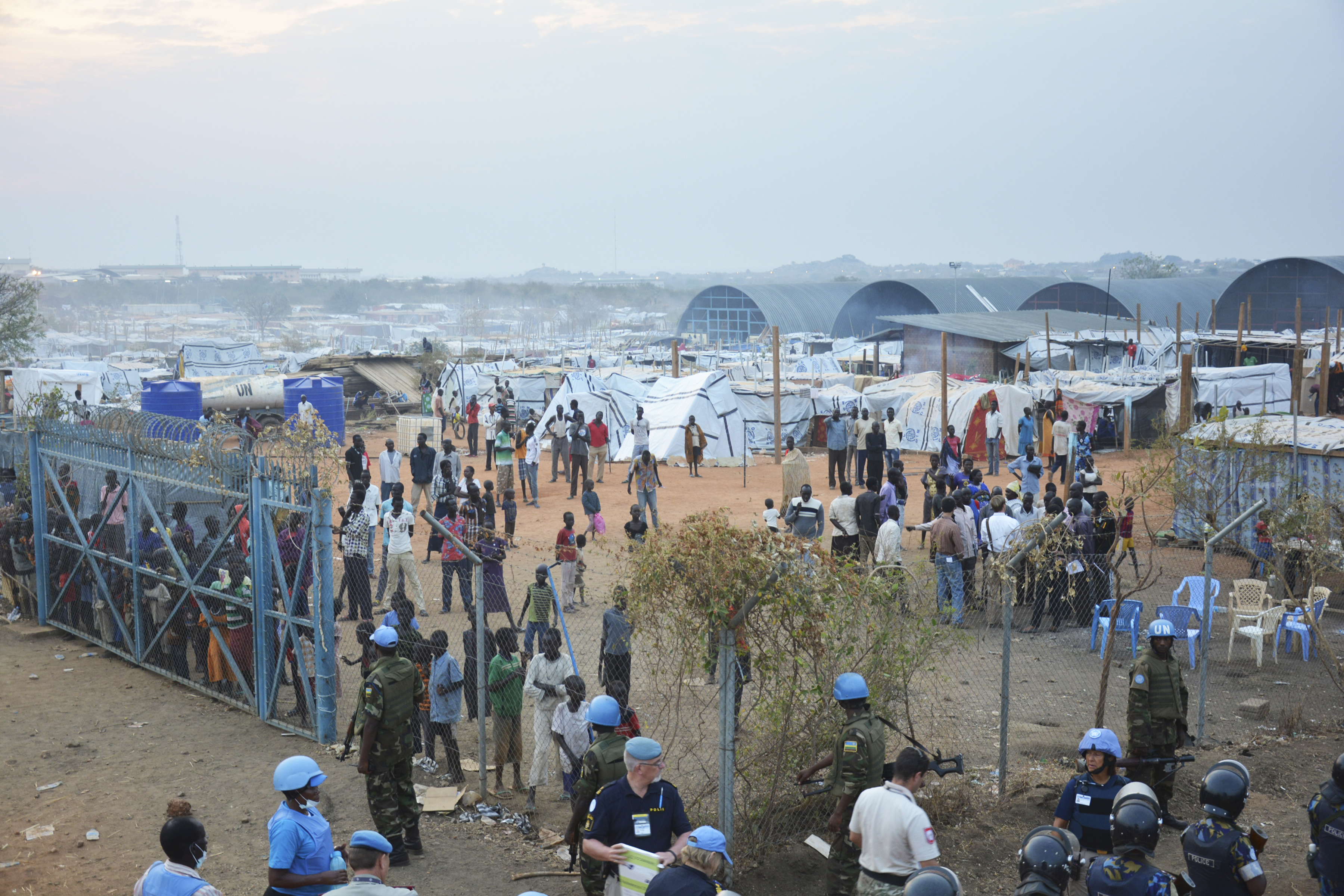In this captivating first hand account of the situation in South Sudan’s IDP camps, South Sudanese Assistant Director for Information and Media at the Relief and Rehabilitation Commission, Afayoa Richard Metaloro, details the actuality of life in the camps, their problems, and some of the measures currently being taken and proposed as solutions for the gender based violence and other issues that plague the lives of residents there.
The camps were set up by the United Nations and other international aid groups to shelter and provide basic human requirements to South Sudanese and others who were displaced by the civil conflict that has raged in the country since Dec. 2013.
Some 30,000 Internally Displaced Persons (IDPs) are being protected by the United Nations in the nations capital, Juba, and 100,000 live in Protection of Civilians (PoC) camps nationwide.
The humanitarian situation across the entire nation of South Sudan remains “dire,” according to the UN. To date, almost 2 million people have been displaced in a nation of 11.3 million. Of those, 1.35 have been displaced internally, while approximately 500,000 have relocated to neighboring countries.
We want to go home whether there is peace or not in South Sudan. The government and rebels must know that they are also citizens of South Sudan, thus deserve equal rights. South Sudanese IDPs are in despair!
In my visit to the IDP camps in Juba–Protection of Civilians (PoC) camps–the IDPs there expressed the bitterness of their situations living in 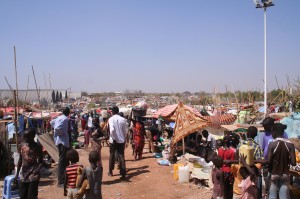 the PoCs, saying that whether there is peace or not, they are eager to move out of the Pocs! To where? Is it safe out there? And who to depend on remained a big and challenging question to all the humanitarian actors working in South Sudan. The living conditions of the IDP’s living in the camps has remained a very big challenge, as the situation has pushed them deep into the misery from where recovery is difficult if not impossible. They are cut off from carrying out livelihood activities, despite the efforts of the humanitarian community in the emergency response to attempt to save lives.
the PoCs, saying that whether there is peace or not, they are eager to move out of the Pocs! To where? Is it safe out there? And who to depend on remained a big and challenging question to all the humanitarian actors working in South Sudan. The living conditions of the IDP’s living in the camps has remained a very big challenge, as the situation has pushed them deep into the misery from where recovery is difficult if not impossible. They are cut off from carrying out livelihood activities, despite the efforts of the humanitarian community in the emergency response to attempt to save lives.
This however, came after several clashes that occurred between the IDP communities within the PoCs, shortages of funding from the donors to the NGOs that led to the cut off of some services, denial by agencies to register new arrivals, incidents of sexual 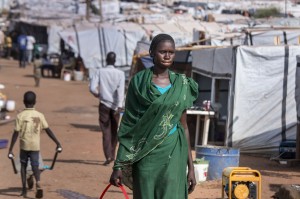 harassment of women and girls by members of various groups such as the UN and and other NGOs, armed groups and the IDP communities within the camps, lack of effective representation for the voice of the voiceless, etc.
harassment of women and girls by members of various groups such as the UN and and other NGOs, armed groups and the IDP communities within the camps, lack of effective representation for the voice of the voiceless, etc.
The government, since the fighting broke out in South Sudan on Dec.15, 2013, payed little attention to the needs of the IDPs living in camps, yet it is a constitutional mandate that a sovereign state ensures the protection and service provision of the affected population in times of civil conflict. Surprisingly, little was done by the government, which pretends to implementing the international humanitarian law despite the huge challenges encountered by humanitarian agencies in delivering humanitarian assistance to needy people. These barriers to assistance include impediments to access the target people, road blocks that  charge huge amounts of cash, rape cases, ill treatment and detentions, and kidnapping and looting of humanitarian items. It is not as if these problems make up the only observations in the humanitarian intervention; the worst case scenarios have been practiced by the rebel side, where there has been a very large number of children abducted for child-soldier recruitment, as well as massacres of innocent lives, arbitrary arrests, detentions, etc.
charge huge amounts of cash, rape cases, ill treatment and detentions, and kidnapping and looting of humanitarian items. It is not as if these problems make up the only observations in the humanitarian intervention; the worst case scenarios have been practiced by the rebel side, where there has been a very large number of children abducted for child-soldier recruitment, as well as massacres of innocent lives, arbitrary arrests, detentions, etc.
Read more: South Sudan: Child Soldiers Enter Fight on Government Army Side, Condemned by Human Rights Watch
The needed response
Many of the threats to women and girls highlighted by assessment participants can and should be mitigated by the humanitarian response. It is 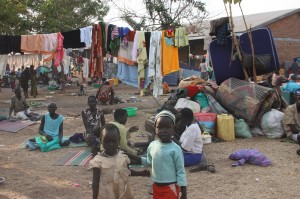 the obligation of the United Nations Mission in South Sudan (UNMISS) and other humanitarian actors to ensure that relief services are not only not harmful, but are also proactive in their interventions to alleviate risks and make the camps a safer environment for women, girls, boys and men.
the obligation of the United Nations Mission in South Sudan (UNMISS) and other humanitarian actors to ensure that relief services are not only not harmful, but are also proactive in their interventions to alleviate risks and make the camps a safer environment for women, girls, boys and men.
As the cooks, cleaners, and caretakers of the family, women and girls ensure lifesaving relief services are used at the household level. The humanitarian community is doing a disservice to families, if relief interventions do not fully incorporate in their lifesaving activities the safety issues that women and girls face as they carry out their essential contribution to their family’s well-being and health.
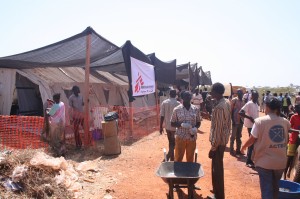 To overcome barriers in the community that prevent survivors from seeking services and to ensure that survivors feel welcome to seek assistance from the available services, outreach and awareness is important.
To overcome barriers in the community that prevent survivors from seeking services and to ensure that survivors feel welcome to seek assistance from the available services, outreach and awareness is important.
Awareness, however, is not enough to encourage survivors to report. GBV and health service providers need to build trust, and therefore must demonstrate that they support the interests of survivors. It is essential that they make concerted efforts to respect survivors by talking with them and listening to their needs and wishes. Confidentiality must be respected. All efforts should be made to ascertain the safest options for survivors before and during interventions to meet their needs for protection and efforts to access justice. Simultaneously, it is necessary to work with the community to change attitudes and practices that stigmatize survivors and create barriers for them to seek help and justice through extended social mobilization and awareness campaigns.
Read more: South Sudanese Propose “Reconciling Many Truths” to End Crisis, Form One Acceptable Narrative
Change has started but vigilance needs to be sustained
According to the camp managers, an assessment was conducted, and the humanitarian response began to mitigate some risks in ways that will 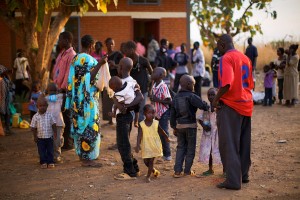 have a positive impact on the safety of women and girls. A new extension has been opened and two-thirds of the population has moved to new residential areas that have been designed to be less congested and to ensure that access to essential infrastructures is more evenly balanced. Congestion and overcrowding has been the underlying factor in many of the risks of gender based violence (GBV) in the original PoC (tight alleys, hidden dark spaces, difficult access to latrines and water, crowded markets, etc).
have a positive impact on the safety of women and girls. A new extension has been opened and two-thirds of the population has moved to new residential areas that have been designed to be less congested and to ensure that access to essential infrastructures is more evenly balanced. Congestion and overcrowding has been the underlying factor in many of the risks of gender based violence (GBV) in the original PoC (tight alleys, hidden dark spaces, difficult access to latrines and water, crowded markets, etc).
Other improvements that can potentially lower risks of GBV have also started, according to the camps’ managers. The structures of the latrines 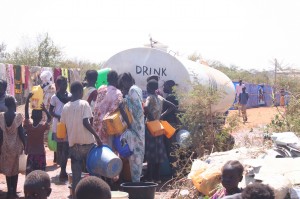 in the new site are more private and safe. A water pipeline is being constructed to provide clean water directly to the site, which will mean that women do not have to take risks when getting water, because there will better quantity and reliable schedules. Handheld torches have been distributed to all households and streetlights are being purchased for installation. Activities targeting adolescent boys and girls are starting. A women’s committee has been formed. United Nations Police (UNPOL) conducts daily patrols and investigates offences agsinst the general public. A holding center is now operational to separate offenders of major public offences, such as rape, according to camp managers in the PoCs. Despite all these improvements claimed by the camp managers, it still has not restored the hope of the IDP community to believe that they can live in safety and move out of the PoCs to their desired locations.
in the new site are more private and safe. A water pipeline is being constructed to provide clean water directly to the site, which will mean that women do not have to take risks when getting water, because there will better quantity and reliable schedules. Handheld torches have been distributed to all households and streetlights are being purchased for installation. Activities targeting adolescent boys and girls are starting. A women’s committee has been formed. United Nations Police (UNPOL) conducts daily patrols and investigates offences agsinst the general public. A holding center is now operational to separate offenders of major public offences, such as rape, according to camp managers in the PoCs. Despite all these improvements claimed by the camp managers, it still has not restored the hope of the IDP community to believe that they can live in safety and move out of the PoCs to their desired locations.
By Afayoa Richard Metaloro
Photos: European Commission DG ECHO, United Nations Photo, Oxfam East Africa, Arsenie Coseac
Afayoa Richard Metaloro is the assistant director for Information and Media in the Relief and Rehabilitation Commission. He was born in South Sudan in 1986 and lived with his family in the Democratic Republic of Congo and Ethiopia as refugees of the Second Sudanese Civil War (1983-2005). Metaloro completed his education in Mass Communication in Kampala and worked as editor and administrator at South Sudan’s electronic news portal, Sudan Tribune.
